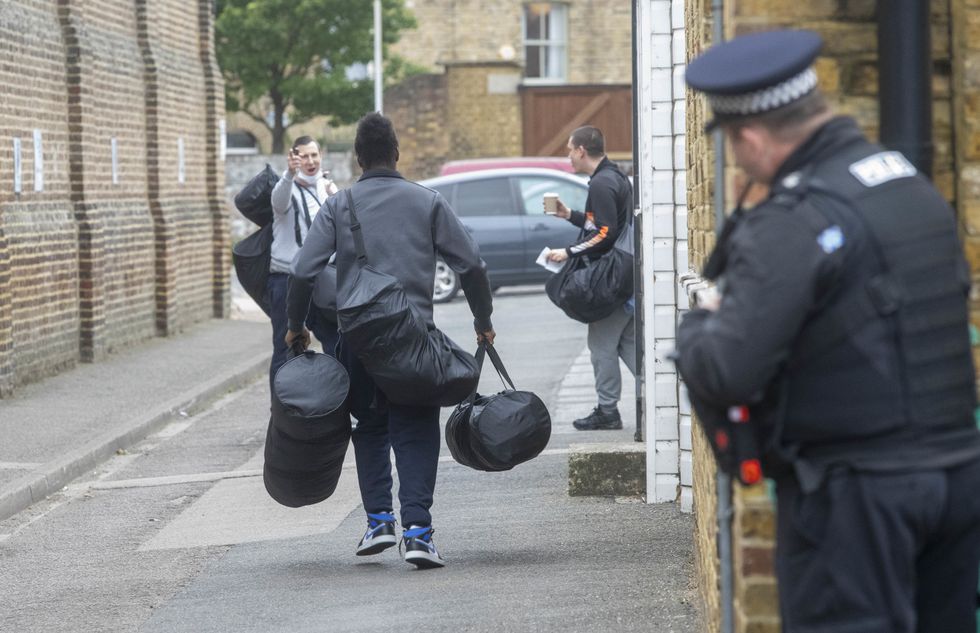GB News Reporter
Guest Reporter
You may remember that in September, Keir Starmer decided to open the prisons, releasing more than 1,700 offenders who had served more than 40 per cent of their sentences.
The consequence of this decision was predictable. Within a matter of hours, one convict released was accused of assaulting a woman before being charged and recalled to prison.
The stated reason for this policy of releasing people was that the prisons were overflowing. Indeed, in August, it was rumoured that a mere 100 prison spaces were left.
But amongst the prison population of 87,000 more than 10,000 are foreign, costing nearly £500million a year to you, the taxpayer.

A more logical solution to our lack of prison spaces, rather than letting people out, is to deport the foreign criminals.
However, there seems to be no great desire to do this, and this isn't particularly the fault of this new government, the last government was just as bad.
LATEST DEVELOPMENTS
Now, new Ministry of Justice data has revealed a quarter of foreign criminals went on to reoffend in the UK after being released from jail and avoiding deportation, totalling about 10,000 offences.
The problem is that the standard practice in the UK has been to make foreign criminals serve between 40 to 50 per cent of their sentences, similar to other malefactors, before attempting to deport them.
While there may be a case for this, in some instances where there are victim interests to consider or the crime is especially heinous, the government's default position ought to be to deport any foreign criminal immediately upon conviction, banning them from returning.

When this default policy has shifted, along with withdrawal from the European Convention on Human Rights and an overhaul of domestic human rights laws to smooth the process of deporting illegal migrants, we may begin to have a serious immigration in enforcement system.
If the government's reaction to Southport proved anything, it is that if there's a political will, it can be done.
If foreign criminality was pursued with the same zeal and efficiency as the Southport riots issue could be put to bed in a few weeks.
Find Out More...
The consequence of this decision was predictable. Within a matter of hours, one convict released was accused of assaulting a woman before being charged and recalled to prison.
The stated reason for this policy of releasing people was that the prisons were overflowing. Indeed, in August, it was rumoured that a mere 100 prison spaces were left.
But amongst the prison population of 87,000 more than 10,000 are foreign, costing nearly £500million a year to you, the taxpayer.

A more logical solution to our lack of prison spaces, rather than letting people out, is to deport the foreign criminals.
However, there seems to be no great desire to do this, and this isn't particularly the fault of this new government, the last government was just as bad.
LATEST DEVELOPMENTS
- Farmer warns of Christmas food shortages as strikes escalate: ‘Labour WILL listen!’
- ‘He is NOT Winston Churchill!’ Nile Gardiner blasts ‘clueless’ Starmer
- Musk’s potential Reform UK donation is ‘rocket fuel’: ‘Could change the face of UK politics!’
Now, new Ministry of Justice data has revealed a quarter of foreign criminals went on to reoffend in the UK after being released from jail and avoiding deportation, totalling about 10,000 offences.
The problem is that the standard practice in the UK has been to make foreign criminals serve between 40 to 50 per cent of their sentences, similar to other malefactors, before attempting to deport them.
While there may be a case for this, in some instances where there are victim interests to consider or the crime is especially heinous, the government's default position ought to be to deport any foreign criminal immediately upon conviction, banning them from returning.

When this default policy has shifted, along with withdrawal from the European Convention on Human Rights and an overhaul of domestic human rights laws to smooth the process of deporting illegal migrants, we may begin to have a serious immigration in enforcement system.
If the government's reaction to Southport proved anything, it is that if there's a political will, it can be done.
If foreign criminality was pursued with the same zeal and efficiency as the Southport riots issue could be put to bed in a few weeks.
Find Out More...